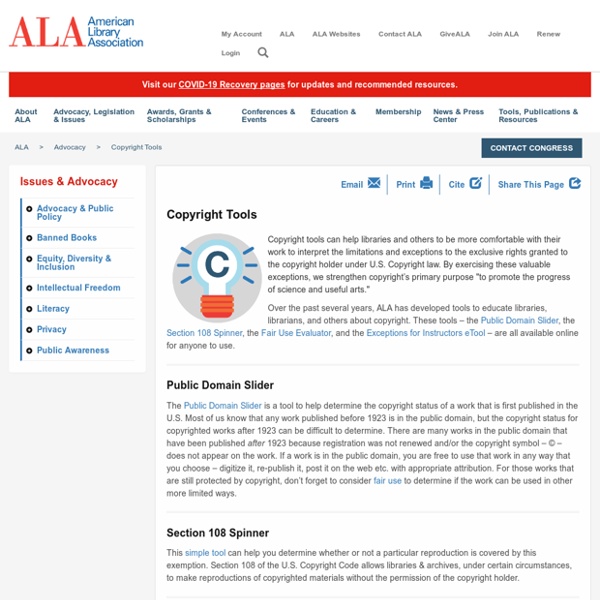Educational Exemptions in the U.S. Copyright Code (from ALA Office of Information Technology Policy)
The U.S. Copyright Code provides for the educational use of copyrighted material without the permission of the copyright holder under certain conditions. To find out if your intended use meets the requirements set out in the law, use this free, online tool. [disclaimer]
Intellectual Freedom: Issues and Resources
A commitment to intellectual freedom transforms your library. ALA actively advocates and educates in defense of intellectual freedom—the rights of library users to read, seek information, and speak freely as guaranteed by the First Amendment. Intellectual freedom is a core value of the library profession, and a basic right in our democratic society. A publicly supported library provides free, equitable, and confidential access to information for all people of its community. Assistance and Consultation The staff of the Office for Intellectual Freedom is available to answer questions or provide assistance to librarians, trustees, educators and the public about intellectual freedom issues and resources.
The public domain and 5 things not covered by copyright (from Creative Commons)
We’re taking part in Copyright Week, a series of actions and discussions supporting key principles that should guide copyright policy. Every day this week, various groups are taking on different elements of the law, and addressing what’s at stake, and what we need to do to make sure that copyright promotes creativity and innovation. Today’s topic for Copyright Week is “Building and Defending the Public Domain”. We know that the public domain is our cultural commons and a crucial resource for innovation and access to knowledge. Copyright policy should strive to promote, and not diminish, a robust, accessible public domain. From a legal perspective, the public domain is the space where no intellectual property rights exist.
School Librarians as Learning Leaders
2016-2017 AASL president Audrey Church’s presidential initiative focused on furthering administrators’ understanding of the key role that strong school libraries and certified school librarians play in student learning. Members of the Presidential Initiative Task Force curated selected quality resources that demonstrate the important instructional role of librarians in 21st century schools. Please utilize these products created by the Task Force to inform principals and other stakeholders that school librarians are learning leaders.
How do you deal with cyber-bullying in schools? – EDTECH 4 BEGINNERS
Recently, I have noticed that cases of cyber-bullying are being reported more and more often in the news. As social media and technology is already a central part of children’s lives, online safety is an incredibly important issue to tackle. What is cyberbullying?
Selection & Reconsideration Policy Toolkit for Public, School, & Academic Libraries
"The library is a growing organism" S.R. Ranganathan (1931) Home | IntroductionWhy Do I Need a Policy? | Politics and Timing of Policy Creation | Selection Policies for Non-Public Institutions
17 U.S. Code § 102 - Subject matter of copyright: In general
house report no. 94–1476 Original Works of Authorship. The two fundamental criteria of copyright protection—originality and fixation in tangible form are restated in the first sentence of this cornerstone provision. The phrase “original works or authorship,” which is purposely left undefined, is intended to incorporate without change the standard of originality established by the courts under the present copyright statute.
School Libraries Transform Learning
This digital magazine produced by AASL in partnership with American Libraries, is designed to be shared with parents, colleagues, administration, and policymakers. Available electronically or as a PDF download, this tool can open the door to discussions on the multiple ways school libraries transform learning. Articles "I'm an Expert" School Librarians Transform Learning Reimagining Advocacy for School Libraries "Do Kids Even Use the Library Anymore?" Creating Coalitions Building Advocacy before a Crisis
Digital citizenship / Teaching
Netsafe – Learn Guide Protect The myLGP website supports the Learn Guide Protect Framework . The site promotes a student-centred approach to teaching and learning about cybersafety and digital citizenship across the curriculum. Developed by NetSafe, in collaboration with New Zealand teachers.
More Information on Fair Use (from Copyright.gov)
Fair use is a legal doctrine that promotes freedom of expression by permitting the unlicensed use of copyright-protected works in certain circumstances. Section 107 of the Copyright Act provides the statutory framework for determining whether something is a fair use and identifies certain types of uses—such as criticism, comment, news reporting, teaching, scholarship, and research—as examples of activities that may qualify as fair use. Section 107 calls for consideration of the following four factors in evaluating a question of fair use: Purpose and character of the use, including whether the use is of a commercial nature or is for nonprofit educational purposes: Courts look at how the party claiming fair use is using the copyrighted work, and are more likely to find that nonprofit educational and noncommercial uses are fair.
Family Educational Rights and Privacy Act (FERPA)
The Family Educational Rights and Privacy Act (FERPA) (20 U.S.C. § 1232g; 34 CFR Part 99) is a Federal law that protects the privacy of student education records. The law applies to all schools that receive funds under an applicable program of the U.S. Department of Education. FERPA gives parents certain rights with respect to their children's education records. These rights transfer to the student when he or she reaches the age of 18 or attends a school beyond the high school level.
A Treasure Trove of Digital Citizenship Resources for Teachers
Via Educational Technology and Mobile Learning There is a special section here in Educational Technology and Mobile Learning where I have aggregated a plethora of resources that teachers can use with their students to teach them about digital citizenship. And today I come across these wonderful resources compiled by Taryn Degnan from Common Sense Media. I thought about tweeting the link without having to share it here but I know thousands of email and RSS Feed subscribers would miss it. Below is a round-up of all the links Taryn featured in her post.



